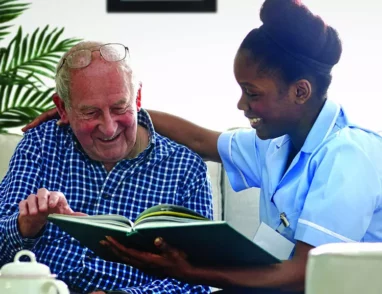COVID-19, LTSS & Emergency Preparedness
May 8, 2020 · Jazmyne Carter
If COVID-19 hasn’t taught us anything else, it’s taught us the importance of emergency preparedness.
This is why emergency preparedness planning is a critical aspect of NCQA’s Long Term Services and Supports (LTSS) accreditation and distinction program standards.
Because, when you fail to plan, you plan to fail.
About LTSS
The NCQA LTSS standards require each client have a personalized emergency plan. Individuals receiving LTSS have unique and complex health care and social needs. Each person relies on care providers to live as independently as possible in the community setting.
Emergency preparedness planning begins at the point of each client’s initial comprehensive assessment. Contingency plans are devised. The client and caregiver discuss emergency planning in detail.
Then, every client has a copy of their plan posted in an easily accessible location, such as the refrigerator door. Case managers prepare for these situations by focusing on maintaining care services, avoiding delays in the delivery of essential supplies and planning for possible back-up caregivers.
The comprehensive LTSS assessment standards pay specific attention to Social Determinants of Health. These are the conditions in the places where people live, learn, work, and play—which impact the quality of health. Identifying issues such as job, food and housing security, neighborhood safety, and education level are pivotal in developing case management plans that specifically address these risk areas.
Who understands those issues and risks better than Community-based organizations (CBO)?
So, we leave it to them to define individualized plans because they know the needs of their community.
LTSS At Work
 We had a chat with Senior Services Southwest Michigan’s (SSSM) Director of Quality & Corporate Compliance Officer, Corinne Bradley. SSSM is a private, non-profit and person-centered organization that has supported the independence and well-being of older adults, adults with disabilities and caregivers throughout Southwest Michigan since 1963. That’s more than 50 years of hard work in the community.
We had a chat with Senior Services Southwest Michigan’s (SSSM) Director of Quality & Corporate Compliance Officer, Corinne Bradley. SSSM is a private, non-profit and person-centered organization that has supported the independence and well-being of older adults, adults with disabilities and caregivers throughout Southwest Michigan since 1963. That’s more than 50 years of hard work in the community.
It was great to hear Ms. Bradley talk about how NCQA’s LTSS accreditation standards are essential because “Everyone had a plan in place”.
When COVID-19 hit, LTSS standards framework, previous emergency deployment experience and guidance from the State’s Department of Health and Human Services supported the development and use of telehealth interventions to maintain vital communication linkage between case managers, care staff, clients and family members.
COVID-19 and LTSS
The COVID-19 pandemic triggered implementation of modified care encounters and emergency plan activation.
SSSM quickly transitioned from face-to-face visits to telephonic encounters. Some services, such as congregate meals and in-office classes, were cancelled to comply with state and federal mandates. Meals-on-Wheels picked up the pace to offset the changes. To maintain safety, additional precautions included screening food prep and delivery staff.
The change was quick but not necessarily easy for homebound clients. Unfortunately, COVID-19 has led to further isolation and missed personal contact from clients. It has also heightened fear in the community. Some clients have refused assistance to prevent outsiders from coming into their homes.
However, SSSM sprang into action with an outreach program. In this program, volunteers call every client weekly to talk, check on how they are doing and troubleshoot early signs of difficulty. Family caregivers have assumed more responsibility, but the agency continues regular telephonic outreach.
SSSM is living proof that with the right plan, quality care can continue even during a pandemic.
When faced with an emergency, LTSS has you covered.
Lastly, we want to hear your ideas, best practices and tips for approaching the current reality of COVID-19. What have you done to define emergency back-up planning? Please share your stories in the comments section below.








